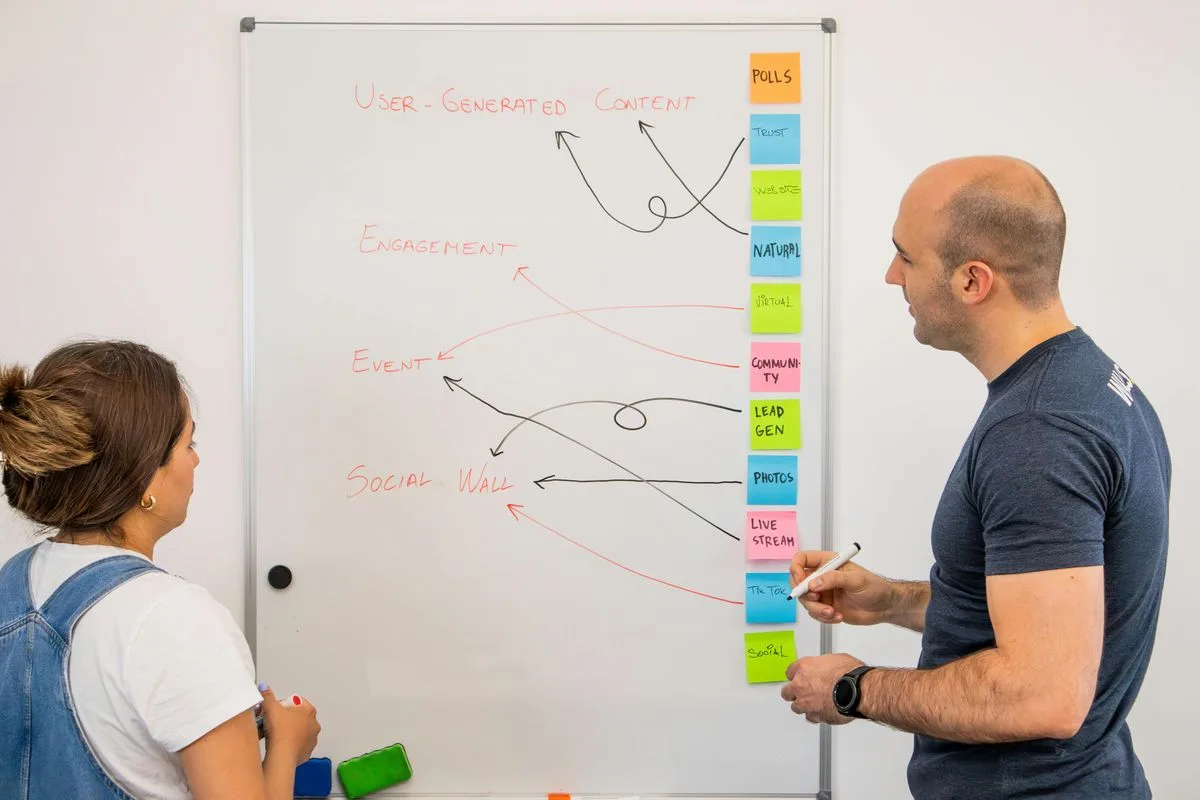Growleady Team
Lead Generation Experts
What is a B2B Job? Roles, Skills, and Rewards Explained
Dive into B2B job descriptions to discover essential skills, work environments, and the challenges and rewards of these roles.

Ever wondered what it's like to work in the business-to-business (B2B) world? You're not alone! B2B job descriptions can be a bit of a mystery, but they're actually pretty exciting once you immerse.
Think of B2B roles as the behind-the-scenes heroes of the business world. These jobs focus on helping companies sell products or services to other companies, rather than directly to consumers. It's a whole different ballgame from B2C (business-to-consumer) and requires a unique set of skills and know-how.
So, why should you care about B2B job descriptions? Well, if you're looking to level up your career or explore new opportunities, understanding these roles could open doors you never knew existed. Ready to uncover the secrets of B2B jobs and see if they might be your next career move?
Understanding B2B Job Descriptions

B2B job descriptions outline the roles and responsibilities of professionals who sell products or services to other businesses. These positions are crucial for driving revenue and fostering growth across various industries.
Defining B2B in the Workplace
B2B, or Business-to-Business, refers to companies that primarily sell products or services to other businesses rather than individual consumers. In the workplace, B2B roles focus on managing relationships between companies, often involving longer sales cycles and more complex buying processes.
Think of B2B as a restaurant supplier selling ingredients to a chain of restaurants rather than directly to diners. It's about understanding the needs of entire organizations and providing solutions that can benefit their operations on a larger scale.
Common misconceptions about B2B roles include thinking they're the same as B2C (Business-to-Consumer) sales. While both involve selling, B2B requires a deeper understanding of business operations and industry trends and the ability to navigate multi-layered decision-making processes.
Relationship Building: The cornerstone of B2B success is forging strong, long-term relationships with clients. This involves:
Identifying and reaching out to potential leads
Understanding their unique business needs and pain points
Building trust through consistent communication and value delivery
Industry Knowledge: B2B professionals must be experts in their field. This means:
Staying up-to-date with industry trends and innovations
Understanding the competitive world
Anticipating future needs and challenges in the market
Strategic Thinking: B2B roles require a strategic approach to sales and account management:
Developing tailored solutions for each client
Creating long-term account growth plans
Aligning your offerings with the client's business goals
Negotiation Skills: Given the complexity of B2B deals, strong negotiation skills are essential:
Handling multi-stakeholder negotiations
Crafting win-win propositions
Managing pricing discussions for large-scale contracts
Technical Expertise: Many B2B roles, especially in tech or specialized industries, require:
In-depth product knowledge
Ability to explain complex features and benefits
Troubleshooting and providing technical support
To excel in B2B roles, you'll need to master the art of cold outreach, whether through email or LinkedIn. Remember, it's not about bombarding potential leads with generic messages. Instead, focus on personalization and providing value from the first interaction.
When crafting your outreach strategy, consider these tips:
Research your prospects thoroughly before reaching out
Tailor your message to address their specific business challenges
Offer insights or solutions that demonstrate your expertise
Follow up consistently, but respectfully
By understanding these key components and honing your skills in each area, you'll be well-equipped to thrive in B2B roles and drive meaningful results for both your company and your clients.
Common B2B Job Titles and Responsibilities
B2B job titles encompass a wide range of roles focused on selling products or services to other businesses. These positions require unique skills and expertise to navigate complex business relationships and drive sales in a B2B environment.
Sales and Account Management Positions
B2B Sales Executive
Develop and present new business proposals to prospects
Sell additional coverage to existing clients
Achieve annual sales goals
Provide regular feedback to the Sales Manager
B2B Sales Specialist
Identify new business opportunities
Develop and execute sales strategies
Build and maintain relationships with key decision-makers
Achieve and exceed sales targets
B2B Salesperson
Manage the sales process from start to finish
Develop relationships with potential customers
Negotiate and close deals
Maintain ongoing account management
Account Manager
Serve as the primary point of contact for assigned clients
Identify upselling and cross-selling opportunities
Resolve client issues and maintain customer satisfaction
Collaborate with internal teams to meet client needs
Business Development Manager
Identify and pursue new business opportunities
Develop strategic partnerships
Conduct market research to identify potential growth areas
Create and carry out business development strategies
B2B Marketing Manager
Develop and carry out B2B marketing strategies
Create content tailored to business audiences
Analyze marketing campaign performance
Collaborate with sales teams to align marketing efforts
Content Marketing Specialist
Produce high-quality, industry-specific content
Develop content strategies for various B2B channels
Optimize content for search engines and lead generation
Measure and report on content performance
Digital Marketing Coordinator
Manage social media accounts for B2B audiences
Carry out email marketing campaigns
Coordinate webinars and virtual events
Track and analyze digital marketing metrics
Communications Manager
Develop and maintain corporate communications strategies
Write press releases and manage media relations
Create internal communications for employees
Ensure consistent brand messaging across all channels
Product Marketing Specialist
Develop marketing strategies for specific B2B products or services
Create sales collateral and product documentation
Conduct competitive analysis and market research
Collaborate with product development teams to align marketing efforts
In B2B roles, you'll find that building strong relationships and understanding complex business needs are crucial. Unlike B2C positions, these jobs often involve longer sales cycles and require in-depth industry knowledge. To excel in these roles, focus on developing your strategic thinking, negotiation skills, and technical expertise specific to your industry.
Essential Skills for B2B Professionals

B2B professionals require a unique set of skills to excel in their roles. These skills combine technical expertise with interpersonal abilities to navigate complex business relationships and drive success in the B2B world.
Technical Expertise
In B2B roles, technical expertise is crucial for understanding and addressing the specific needs of business clients. You'll need:
Industry knowledge: Stay up-to-date with the latest trends, regulations, and technologies in your industry.
Product expertise: Develop a deep understanding of your company's products or services and how they solve business problems.
Data analysis: Use data to identify trends, make informed decisions, and demonstrate value to clients.
CRM proficiency: Master customer relationship management tools to track interactions and manage client relationships effectively.
Digital marketing skills: Understand how to leverage various digital platforms to reach and engage B2B audiences.
To enhance your technical expertise:
Attend industry conferences and webinars
Pursue relevant certifications
Read industry publications and reports
Collaborate with colleagues from different departments
Soft Skills and Interpersonal Abilities
While technical skills are important, soft skills often make a difference in B2B success. Key interpersonal abilities include:
Communication: Articulate complex ideas clearly and tailor your message to different stakeholders.
Active listening: Understand client needs by asking thoughtful questions and paying attention to their responses.
Negotiation: Navigate complex deals and find mutually beneficial solutions.
Relationship building: Cultivate long-term partnerships based on trust and mutual value.
Adaptability: Adjust your approach to meet the unique needs of each client and situation.
To improve your soft skills:
Practice public speaking
Seek feedback from colleagues and clients
Engage in role-playing exercises to simulate challenging scenarios
Develop emotional intelligence through self-reflection and mindfulness practices
Remember, B2B relationships often involve longer sales cycles and multiple decision-makers. Your ability to combine technical expertise with strong interpersonal skills will set you apart in the competitive B2B world.
Typical Work Environment in B2B
B2B professionals typically operate in dynamic, rapid environments that demand adaptability and strategic thinking. Your workspace may vary depending on your specific role and company, but here are some common elements you'll encounter:
Office-Based Work
Most B2B jobs involve a significant amount of office-based work. You'll likely spend time:
Analyzing market trends and competitor data
Preparing sales presentations and proposals
Collaborating with team members on strategies
Managing customer relationships through CRM systems
Modern offices often feature open floor plans to encourage collaboration and idea-sharing. You'll have access to meeting rooms for client calls and team discussions.
Remote Work Opportunities
Many B2B companies now offer remote work options. This flexibility allows you to:
Work from home or co-working spaces
Attend virtual meetings with clients and colleagues
Use cloud-based tools for project management and communication
Remote work in B2B requires strong self-discipline and excellent time management skills.
Client-Facing Activities
B2B roles often involve frequent client interactions. You may:
Travel to client offices for in-person meetings
Attend industry conferences and trade shows
Host product demonstrations or training sessions
These activities require professional attire and a polished demeanor to represent your company effectively.
Collaborative Teamwork
B2B success relies heavily on teamwork. Your work environment will likely include:
Regular team meetings to discuss progress and strategies
Cross-departmental collaborations (e.g., with marketing or product development)
Mentoring programs for skill development
Effective communication and relationship-building skills are crucial in this collaborative setting.
Technology-Driven Environment
B2B professionals work with various technological tools:
CRM systems for managing customer data
Analytics software for tracking sales metrics
Video conferencing platforms for remote meetings
Digital marketing tools for lead generation
Staying updated with the latest tech trends is essential in the B2B world.
High-Pressure Situations
The B2B environment often involves:
Meeting sales quotas and performance targets
Negotiating complex deals with high stakes
Managing multiple projects and client relationships simultaneously
Developing stress management techniques is crucial for long-term success in B2B roles.
Continuous Learning
B2B environments emphasize ongoing professional development:
Regular training sessions on new products or industry trends
Workshops to enhance sales and negotiation skills
Opportunities to earn relevant certifications
This focus on learning ensures you stay competitive in the ever-evolving B2B market.
By understanding these typical elements of a B2B work environment, you can better prepare for the challenges and opportunities that await in your B2B career. For example, at GrowLeady, continuous learning is integral to their work culture.
They provide their team with regular updates on the latest B2B technologies and industry practices, as well as professional development opportunities to sharpen skills and gain certifications.
Understanding these typical elements of a B2B work environment, such as those exemplified by GrowLeady, can better prepare you for the challenges and opportunities that await in your B2B career.
Career Growth and Advancement in B2B
Climbing the B2B career ladder offers exciting opportunities for professional growth and financial rewards. As you gain experience and hone your skills, you'll find numerous paths for advancement in this dynamic field.
Entry-Level Positions
Starting your B2B journey typically involves roles like:
Sales Development Representative (SDR)
Junior Account Executive
Marketing Coordinator
Customer Support Specialist
These positions provide a solid foundation for understanding B2B operations, client interactions, and sales processes.
Mid-Level Roles
With a few years of experience, you can progress to:
Account Manager
Sales Manager
Marketing Manager
Business Development Manager
These roles involve more strategic responsibilities and often require team leadership skills.
Senior Positions
As you excel in mid-level roles, opportunities for senior positions emerge:
Director of Sales
Vice President of Marketing
Chief Revenue Officer
Key Account Executive
Senior roles focus on high-level strategy, large-scale business development, and organizational leadership.
Specialization Opportunities
B2B careers offer various specialization paths:
Industry-specific sales (e.g., SaaS, Healthcare, Finance)
Channel sales
Enterprise sales
Solution selling
Technical sales
Specializing can lead to higher salaries and more targeted career opportunities.
Skill Development for Advancement
To climb the B2B career ladder:
Enhance your industry knowledge
Develop strong negotiation skills
Master data analysis and CRM tools
Improve your presentation and public speaking abilities
Cultivate leadership and mentoring capabilities
Continuous learning and adaptability are crucial for long-term success in B2B roles.
Networking and Professional Associations
Join industry associations and attend networking events to:
Stay updated on industry trends
Meet potential mentors and employers
Share best practices with peers
Discover new career opportunities
Organizations like the American Association of Inside Sales Professionals (AA-ISP) and the National Association of Sales Professionals (NASP) offer valuable resources and connections.
Transitioning to Entrepreneurship
Many successful B2B professionals leverage their experience to:
Start their own B2B companies
Become independent consultants
Launch sales training programs
Entrepreneurship offers a natural progression for those with extensive B2B expertise and a desire for greater autonomy.
By focusing on continuous improvement, building a strong professional network, and staying adaptable, you can create a rewarding and lucrative career path in the B2B sector.
Challenges and Rewards of B2B Positions
Overcoming Complex Sales Cycles
B2B sales cycles are often longer and more complex than B2C transactions. You'll navigate multiple decision-makers, extensive research phases, and detailed negotiations. To succeed:
Develop patience and persistence
Create tailored solutions for each client
Build relationships with various stakeholders
Use strategic follow-ups to maintain engagement
Mastering Technical Knowledge
B2B roles require in-depth product knowledge and industry expertise. You'll need to:
Continuously update your technical skills
Understand complex product specifications
Explain intricate features in simple terms
Stay informed about industry trends and innovations
Balancing Relationship Building and Sales Targets
In B2B, long-term relationships are crucial, but so are sales targets. To strike the right balance:
Focus on client success, not just closing deals
Set realistic expectations with clients and management
Provide ongoing support and account management
Use data-driven insights to identify upsell opportunities
Adapting to Changing Business Landscapes
B2B markets evolve rapidly. To stay competitive:
Embrace digital transformation in sales processes
Adapt to remote selling and virtual demonstrations
Learn new technologies and sales tools
Anticipate market shifts and adjust strategies accordingly
Rewards of B2B Positions
Even though the challenges, B2B roles offer significant rewards:
RewardDescriptionHigher Income PotentialLarger deal sizes often lead to higher commissions and bonusesProfessional GrowthOpportunities to develop advanced business and negotiation skillsStrategic ImpactInfluence on both your company's and clients' business outcomesDiverse NetworkingBuild relationships with industry leaders and decision-makersCareer AdvancementClear pathways to senior roles like Account Executive or Sales Director
By mastering these challenges and leveraging the rewards, you'll position yourself for a successful and fulfilling career in B2B sales and marketing.
Conclusion
B2B job descriptions offer a gateway to a dynamic and rewarding career path. They demand specialized skills adaptability and resilience. While challenges like complex sales cycles and technical knowledge exist you'll find ample opportunities for growth and success. With higher income potential strategic impact and diverse networking B2B roles can lead to significant career advancement. By understanding these unique aspects you'll be well-equipped to thrive in the B2B world. Whether you're just starting out or looking to transition B2B positions offer a promising avenue for professional development and success.
Frequently Asked Questions
What are the key skills required for B2B jobs?
Key skills for B2B jobs include relationship building, data analysis, adaptability, and effective communication. Specialized technical knowledge and the ability to navigate complex sales cycles are also crucial. B2B professionals should be adept at balancing relationship building with meeting sales targets and be able to adapt to changing business landscapes.
How does the work environment in B2B differ from B2C?
B2B work environments often require more adaptability and effective communication skills. Professionals in B2B roles typically deal with longer sales cycles, multiple decision-makers, and more complex products or services. The focus is on building long-term relationships with clients and providing tailored solutions to meet specific business needs.
What are the main challenges in B2B roles?
The main challenges in B2B roles include navigating complex sales cycles, mastering technical knowledge of products or services, balancing relationship building with sales targets, and adapting to changing business landscapes. B2B professionals must also be prepared to deal with multiple stakeholders and longer decision-making processes.
What rewards can one expect from a career in B2B?
Rewards in B2B careers include higher income potential, opportunities for professional growth, and the ability to make a strategic impact on businesses. B2B roles also offer diverse networking opportunities and clear paths for career advancement. The satisfaction of solving complex business problems and building long-term client relationships is another significant benefit.
How can one prepare for a successful career in B2B sales and marketing?
To prepare for a successful B2B career, focus on developing strong communication and relationship-building skills. Gain expertise in data analysis and stay updated on industry trends. Cultivate adaptability and resilience to handle complex sales cycles. Seek opportunities to understand various business models and develop a strategic mindset for problem-solving.


